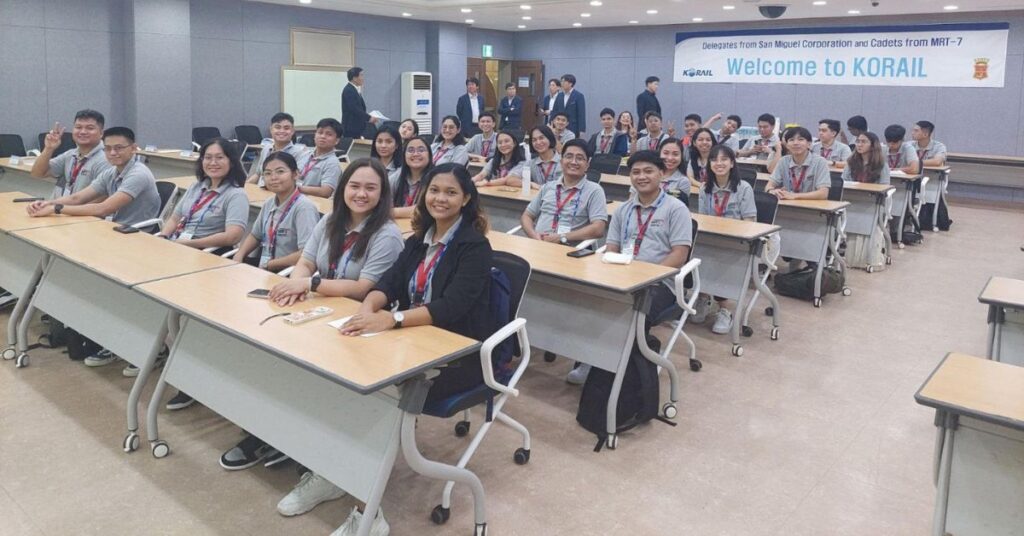Table of Contents
San Miguel Corporation (SMC) has selected 115 promising engineering graduates from various universities in the country to undergo extensive training for the commercial operation of its cutting-edge Mass Rail Transit (MRT-7) project in 2025.
The move is part of the company’s commitment to empowering the youth and harnessing local talent for its nation-building initiatives.
MRT-7 Project and the PUP Engineering Graduates
“MRT-7 promises to be a game-changer for the Philippine transportation landscape, and we are confident our young professionals will set new benchmarks in efficiency, safety, and service excellence,” SMC President and CEO Ramon S. Ang said.
The new graduates — mainly from the Polytechnic University of the Philippines’s (PUP) Railway Engineering Program, the only specialized program in the country — have already started training there. At the same time, 40 cadets who topped evaluation tests were sent to South Korea to train under its national railway operator, Korail, SMC’s partner in the MRT-7 project.

“Investing in the growth, development, and well-being of young local talents is part of our commitment to nation-building and ensuring our country’s long-term success and prosperity. We want to be able to provide them with the tools they need to enhance their competencies, prepare them for when the MRT-7 starts operating, and eventually make meaningful contributions to the wider community. I am confident they will shine and redefine standards,” Ang said, adding that this aligns with SMC’s broader strategy of fostering a diverse and inclusive work environment.
Over 500 applicants initially underwent panel interviews and screening for the program. This included an aptitude test for train operators and traffic controllers. The 115 candidates who were cleared began training last March.
SMC tapped South Korea’s KORAIL and the government-run Philippine Railway Institute (PRI) to provide industry-level insights into train operations and maintenance for its railway cadets, who will become skilled train operators and traffic controllers.
KORAIL’s corps of railway professors began classroom lectures in Manila in May, with the entire batch of cadets in attendance. After further performance evaluations, the top 40 cadets were sent to Seoul to continue training at the KORAIL facility.

This includes hands-on training using a driving simulator, exposure to core technology for driving and operations, railway control systems, first aid and emergency, and familiarization with the railway depot.
Meanwhile, 75 other cadets are undergoing the PRI’s mandatory Fundamental Training (FT) course, the rail transportation research and training center attached to the Department of Transportation.
The FT course provides an industry-level appreciation of railway operations and maintenance. It seeks to provide aspiring railway professionals “the opportunity to learn technical skills and fundamental processes, with multiple paths to specialization and advancement within the railway sector.”
Cadets who graduate from the course become certified railway professionals such as train operators, traffic controllers, and maintenance personnel.
Jizelle Hasco, an aspiring train operator, said that the MRT-7 project had opened a “window of opportunity” when all the railway industry doors seemed “impenetrable” for a fresh graduate like her.
“I was about to give up looking for a job in the railway industry and just search for a role in construction. But my elder sister encouraged me to continue to look for a job related to my field. While most railway projects are still in the construction phase, it is only MRT-7 which entertained applicants who are fresh graduates,” she said.
“Ang MRT-7 na lang po ang pag-asa ko na makapasok sa railway industry. Maliit po kasi ang railway industry dito sa atin. Bibihira po magbukas ng pagkakataon para sa mga fresh graduates tulad ko,” she added.
Hasco, 23, relayed the opportunity to her friends and batchmates at PUP. “Our entire batch at the railway engineering [program] pinned our hopes that we would be part of the railway industry through MRT-7,” she continued.
“Ang laki ng opportunity for me personally na isang fresh graduate pa lang, tapos biglang lipad. Sobrang thankful ako sa SMC at may binigay na opportunity na ganito para sa akin. Kaya ginalingnan ko sa cadetship para dito kasi may trabaho akong makukuha para sa akin at sa pamilya ko.”
At the send-off ceremony recently for the Korea-bound trainees, the cadets were urged to do their best “to represent not just our company, but our country in South Korea.”
“You will have the privilege to learn from the best in the industry, acquire cutting-edge skills, and gain experience that will allow you to excel in your respective roles. I wish all of you to make the most of this opportunity,” Ang told the cadets.
“This is not just a professional journey but a personal one that will help shape your lives and careers. More importantly, your learnings and experiences will translate to benefits for our fellow citizens. I look forward to the day when you take the lead in serving millions of Filipino commuters,” he added.
Read Triumphant SMC Secures P100-B Syndicated Loan for MRT-7 Project, SMC begins work on MRT-7 train depot in SJDM, and MRT-7 is key to accelerating economy’s recovery post-pandemic.